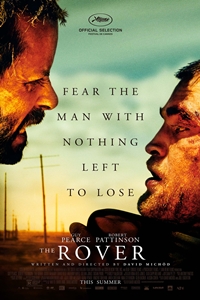 The Rover
The Rover
Starring Guy Pearce, Robert Pattinson, Scoot McNairy, Gillian Jones, and David Field
Directed by David Michôd
Rated R
Run Time: 102 minutes
Genre: Crime Drama
Opens June 20th
By Eric Forthun of Cinematic Shadows
The Rover is cold and distant, an unforgiving venture into the heart of economic collapse and personal despair. Writing about the film is one of the more difficult reviews I’ve taken because this opening paragraph has been writing multiple times, each with different takes on the material. There are narrative faults that I find unforgiving and a general set-up that lacks payoff, but the film remains one of the more thematically involving, dense works to reach cinema in quite some time. I found the film empty and calculated and myself wanting more of an emotional connection with the extraordinarily introverted protagonists. But the film’s final half hour does something remarkable: it allows the audience to see everything the film has to offer emotionally while at the same time numbing the audience with senseless violence and pitiless human interaction. It’s as if the filmmakers aimed to desensitize the audience throughout the entirety of the picture and then provide them with a punch to the gut. Instead, they graze the side and give us a bruise.
Set ten years after a global economic collapse, the story centers on the deserted Australian outback where people fight for survival and kill remorselessly. Eric (Guy Pearce) is seen in the film’s opening moments as a silent, ruthless man hunting down his stolen car. Three men hop in while he’s sitting inside a nearby abandoned bar and he insists on getting his car back. Obviously there’s something important in there because he can find another functioning car…so what makes this one so important? That’s the central motivation for Eric throughout the film, with the reveal being teased until its explanation in the final scene. Eric’s journey leads him to discovering a brother of one of those thieves, a young man named Rey (Robert Pattinson) who was left for dead amidst a military battle. He has a gunshot wound to his stomach, and when Eric discovers him he knows that Rey needs help. He also knows that Rey can lead him to his brother and therefore his car.
When dissecting the plot like that, it makes the film seem trivial and simple. At times, it certainly is. This isn’t a narratively complex work when we get past the central premise of economic despair; there are hints at how it could have happened, with everyone insisting on using American currency over anything else, but there’s never a sense of what happened. There are talks of Eric being a farmer while Rey used to live on a farm when he was a kid and everything was overgrown and lost. This world hates them and gives them nothing in return. I find those elements of the film the most affecting and engaging, yet director David Michôd seems to spend more time focusing on the brutality of the world and its uncompromising violence. The film never shies away from gory details, showing a man’s slit throat after a battle and the aftermath of a child being shot dead, amongst others. One horrifying scene shows the men driving by electrical posts that have men tied to them as if they were being crucified. There’s a callousness to the protagonists and their surroundings.
Guy Pearce and Robert Pattinson sell that perfectly, for they are the reason you will get something out of The Rover. Pattinson fills Rey with a tenderness and an endless string of regret and guilt; subtlety exudes from his every action. It’s a remarkably great performance from an actor I have always found grating and insincere. He mines this work for gold. Pearce allows Eric to be a generally unlikable and stubborn man, but the film asks for the audience’s forgiveness on his part in the film’s final moments. He’s always been an outstanding actor and his work here is exemplary. The film uses these performances to explore complex themes, from military presence to economic ruin to violent depravity to using art as a means of connecting to an older, simpler time. But as I reach for understanding the film’s purpose, I cannot get past the hokey, contrived reveal at the conclusion and the meandering nature of the narrative. The Rover is a lofty, beautifully desolate film, but it’s also an emotionless, unreachable enigma.









